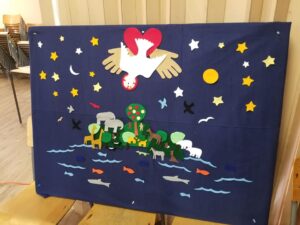
The new felt board for telling stories at Messy Church. Come check it out! The next one is Noah’s Ark, on Oct. 4.
It’s been common over the last couple of decades for people who used to talk about “Christian Education” to switch and use the term “Christian Formation” instead. In many parts of the English-speaking Anglican world, this term has required some unpacking before it is understood. In Quebec, we begin a little bit ahead of the game, because “formation” is actually quite commonly used here in French to mean various kinds of training. But at a meeting recently, I used it and one response was “I don’t know what that means in English! When I see it, it’s like I’m seeing an Anglophone use a French loan-word, like ‘depanneur’!”
So, what do we mean when we say “Christian formation” in a church context?
The reason for the shift from “education” to “formation” is that “education” came to be seen as restrictive, implying that a scholastic model of classroom-based learning, memorizing facts and assimilating content, was enough for create a new generation of Christian disciples. This is manifestly not true, as we can see from the results of a couple of generations of sequestering children in classrooms until confirmation and expecting them to emerge as mature and engaged Christians. In droves, instead, they simply treated confirmation as graduation from church, and most were never seen again.
If we want kids to play baseball, we don’t sit them in a classroom and teach them about the infield fly rule until they’re 16; we put a bat in their hands and have them play the game, even if the results are hilarious and chaotic for years until they start to figure it out. Forming a child as a baseball player takes place on the field, and forming a child as a Christian takes place in the sanctuary, the fellowship hall, the small group conversation, and the soup kitchen, as much as or more than it does in a classroom. We teach people to be Christians by having them do what Christians do, explaining it, helping them figure it out. This is what we mean by formation: shaping the whole person, through worship, music, prayer, reflection, learning, and serving.
Messy Church is our prime means of children’s formation currently, and we are actively working to make it even more welcoming and to give it more theological depth and substance. We want to convey a faith big and flexible enough to grow with the child, rather than to be cast off as just another thing to grow out of.
Part of participating in children’s formation at church is actively welcoming them (and others who might have difficulty sometimes in behaving “appropriately”) in worship. Beautiful and dignified worship is a priority, but if that goal is elevated above the goal of enabling the youngest Christians to learn and grow in the midst of the Christian community, it becomes an idol. This past Sunday, we had nine children under twelve in the 10:00 service. This is a wonderful thing to be celebrated – and it also meant a significantly elevated noise level.
In the long run, there are things we can (and very likely should) do to make it easier for kids to be in worship quietly and attentively, like creating a “soft space” or “pray-ground” as an improvement over the current children’s space in the chapel. But in the meantime, one of the most basic ways we live out the vows we have made to the children who come for baptism is by supporting their presence here, noise, wiggles and all, and constantly finding ways to be more intentional about including children of all ages in the worship service and helping them to encounter God through it.
And Christian Formation is not just for kids: it should be lifelong, and we have a number of great opportunities for adult formation this fall. Bible Study continues every Wednesday morning at 10:30, looking at the readings for the upcoming Sunday, and preceded by Morning Prayer at 10. Our group discussing “The Path”, a method of working through the whole Bible in a year, meets for the first time tomorrow, Friday, Sept. 13, at 5:30 PM (if you want to join the group at the last minute let Grace know!). And we’ll once again be participating in Montreal Dio’s online course on the Gospels (this year, it’s Matthew), starting on Tuesday, Oct. 15 at 7 PM in the loft room.
I hope you’ll join us for some or all of these opportunities, and keep bringing up other ways that All Saints’ can support the lifelong formation of all its members!
Leave a Reply